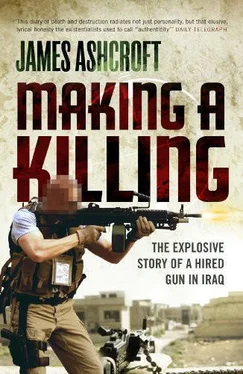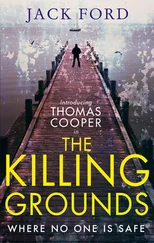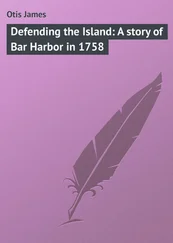I knelt in the back with the paratroopers, our weapons pointing out over the sides, while the SAW gunner stood, resting his M249 on the roof of the cab pointing forward. The gunner in the vehicle behind us had a 7.62mm M240, which is basically the same as the British GPMG. One of the other load-carrying Humvees had a steel post and pivot mounting a second .50 cal.
I had heard many gripes from US soldiers about Humvees, but that afternoon out on the range I was impressed. Much like the Land Rovers I was more familiar with, the cross-country performance was surprisingly good. Carrying very little armour and therefore weight we were soon flying across the ground. Dust was billowing up around us from the vehicle in front and for once I was glad of my sensible shades.
We skidded to a halt at the tall metal gates in the pulverised wall. Potter, one of the soldiers from our vehicle, de-bussed and checked for booby traps; I jumped down to go with him. It wasn’t my job but, with Northern Ireland and Bosnia on my CV, I probably had more experience of IEDs and booby traps than this entire platoon. I didn’t want to see any of these guys get blown up, but there was a selfish motive: I was going to be driven through this gate in a few moments.
I gave Potter the nod. The gates were clean. The lead Humvee crashed its way through as we doubled back to our wagon and followed in the dust storm as the platoon wove a path along the dirt tracks used by the cultivation crews. The Kiowas were circling a few hundred metres in front of us and, over the slight comms delay, we got the message that they had found the terrorists, two or perhaps three guys. We took a road off to the side and started a detour to circle around to their position. I was glad that Gus was using his head. A less cautious officer might have ordered his platoon straight down the most direct track towards the fleeing enemy. That’s how you find mines and IEDs the hard way.
I took advantage of the lull to dig out my IRAQNA and called Seamus.
‘Hello, mate, how are you doing?’ he asked immediately. I knew by the sound of slurping he was busy getting down his tea and biscuits.
‘Good, mate. Only two or three enemy who have broken contact and withdrawn. Gus’s lot are in pursuit. We’ve got six Humvees and two helicopters. I’ll give you a call when I’m on my way back.’
I tried to sound as nonchalant as possible. After all, I didn’t want these Americans to think I was excited or stressed.
‘OK, cheers, see you in a bit.’
As we approached the last sighted enemy position, Gus divided his vehicles in two groups, three circling one way and three the other.
Further ahead there was a complex of villas. The Kiowas were swooping in wider circles like disturbed hornets and confirmed to Gus that the bad guys had gone to ground there. A couple of the villas were piles of charred masonry, there was one with the roof in place, and another had been sliced cleanly in two like a doll’s house with the front open, some scraps of furniture clinging to the concrete floors suspended precariously into space.
The three Humvees circled the space before pulling up, engines running. We sat there for a moment as Gus considered the ground to his front. It’s important never to hurry these things. To take time, take stock, wait for the enemy to make a mistake rather than rush in and make one yourself. Gus de-bussed, making hand signals and delivering clear orders into his radio handset. The drivers and roof gunners remained in position, the rest scrambled out.
As soon as I jumped down from the vehicle, I took cover behind the engine block in a firing position on one knee. The Americans who had already de-bussed were standing around as if they were waiting for a train. When they saw my action, they sheepishly did the same. Their sergeants spread them out ready to go.
The other three Humvees by this time had turned up on our left, flanking the complex, and Gus gave the order over the radio for them to de-bus. He had established his platoon HQ behind a low wall and had a good view of the complex. He had two machine guns for fire support and a radio operator with him. He wanted to clear the area but was aware of the possibility that squatters might be living in the ruined villas. We couldn’t just strafe the buildings and grenade each room.
We were now facing south with the river running along our right-hand side, acting as a boundary that he could anchor his flank on. Three squads were in all-round defence with the other group of Humvees over on the left securing the left flank and also providing fire support to the front. Gus gave the order and his three squads moved forward, leapfrogging one another, going down and covering the next one to move forward.
This was bandit country and the enemy could have been anywhere around us. I had three choices: scramble over to the wall and hang out with Gus; climb back in the Humvee and watch the action from a higher vantage point; or join in with one of the squads which I had noticed was a man short.
I attached myself to Potter and the squad from our Humvee. They were now moving forward along a fold of ground near the river. At least this way I would still be performing the valuable task of guiding the CF through an area of which I had local knowledge and would be able to point out to the forward squads any farms that I knew had ‘friendly’ civilians. Any farmers would also probably be more willing to talk to me as the local Spartan representative than to the Amerikeeyeh.
As I passed one of the gun trucks I paused by the gunner. He had a .50 cal pointed at the villa and an M4A1 carbine with a 40mm grenade launcher sitting on the roof next to him for snap shooting. He also had an M249 SAW sitting on the roof behind him. In the British Army soldiers call them Minimis.
‘I don’t want to be too cheeky, mate, but are you using that right now?’ I pointed at the light machine gun.
‘Naw, buddy. You take it and go kick some doors.’ He grinned back and handed me down the SAW.
I slung my rifle on my back, tightening the strap so that it was tight against my body. I took the SAW, pointed it into the plantation away from the rest of the platoon, cocked the weapon and popped on the safety catch. Then I crouched down and doubled forward to catch up with the squad.
We were five men, Potter, two specialists, as the Americans call privates, Sergeant Navarro, a guy no more than 5ft 2in who looked like a head waiter, and myself. They all looked happy to see me, especially with the extra firepower. We were calling out to the squads left and right of us, ducking down every few yards as we approached the main building. The roof was in place and the windows had been blown out.
In thirty seconds we were up against the wall, weapons pointing forwards, backwards and out to the side. No one seemed to be looking up so I covered the windows above us. In street-fighting you stick as close to walls as possible. That way if an enemy wants to shoot you he has to lean out, and that’s when you give him the good news. We waited while another squad secured the entrance. I noticed the eyes of the specialist next to me glaze over slightly. He was stressed and totally focused to the point of tunnel vision down the sight of his weapon. He was panting rapidly. I checked his name tag.
‘Hey, Moss,’ I hissed. ‘Moss. Hey, how does my hair look?’
‘Huh?’ He looked at me blankly, still taking quick, shallow breaths.
‘How does my hair look?’ I gave my hair a quick pat down. ‘Might be some ladies in there and I want to impress them.’
Suddenly he smiled, the tension broken.
‘You’re looking good, sir.’
‘I know, mate, but I never get tired of hearing it.’
His smile broadened as he returned to scanning the plantation over the top of his weapon. His breathing was back to normal and his face was relaxed although still concentrated.
Читать дальше












